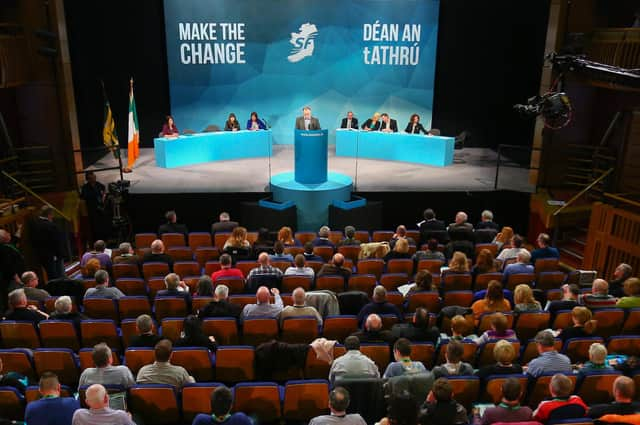Ruth Dudley Edwards: Vote down the ballot for the good guys, so that Sinn Féin lose


First and foremost, I want the bad guys to lose.
These, of course, are Sinn Fein, that cancer corrupting Ireland, and any other parties or independents who justify terrorism of any stripe.
One of the reasons that despite my southern background I came to love Northern Ireland was that despite terrible provocation, constitutionalists — nationalist and unionist — had the moral and physical courage to stand up to fascists, and save the province, and indeed the whole island, from civil war.
Advertisement
Hide AdAdvertisement
Hide AdSo I’m pleading with the good guys to remember that to stay at home because you can’t be bothered to go to the polling station, is to hand a vote to bad guys.
And if you’ve forgotten who these are, or have been lulled into believing that Sinn Fein are becoming genuine democrats, have a look at a letter revealed at the weekend.
In April 2019 the party had vociferously condemned the murder of journalist Lyra McKee by the New IRA: in November 2020, Brian Kenna, the chairman of Saoradh, its political wing, received a letter from Sinn Fein’s national chairman Declan Kearney suggesting a meeting “with myself and other members of the Sinn Fein leadership”, to discuss “developing a common strategy and co-operation” around a referendum on Irish unity”.
Winning that “will bring a new momentum to the achievement of a national republic,” he wrote.
Advertisement
Hide AdAdvertisement
Hide Ad“Sinn Fein believes it should be an immediate political priority for all republicans, progressives and democrats.”
Although Sinn Fein change their stated principles with astonishing regularity, their leadership, and those veterans who influence them, care only about achieving a united Ireland by whatever means necessary.
In terms of political evolution, Saoradh are stuck in somewhere in the 1970s, so Kenna’s response when questioned by the Sunday Times was: “Those peddling this approach are partitionist and reformist and serve only to prolong the shelf life of Stormont and its institutions.”
Which leaves Sinn Fein focusing on corrupting the gullible in the middle ground.
Advertisement
Hide AdAdvertisement
Hide AdSo my second priority is to see a vote that strengthens the Union.
And that requires unionists to suspend the family squabble and get the vote out.
Forget your complaints about other strands of unionists being too hard line, too weak, too stuck in the past, too progressive, or whatever else is getting on your nerves, and vote for all of them in whatever order appeals to you.
I thoroughly recommend reading the fascinating, no-holds-barred paper ‘The Northern Ireland Protocol: how we got here, and what should happen now?’ (the web version of this article will have a link to it).
Advertisement
Hide AdAdvertisement
Hide AdIn it, the tough Brexit negotiator and passionate unionist Lord Frost gave last week to the distinguished think tank Policy Exchange.
He resigned from his job some time back because he disagreed with the government’s negotiating tactics, so he should carry conviction when he says bluntly to unionists that it is unfair to accuse the government of having had no regard to the interests of Northern Ireland in agreeing the protocol and now “of being reluctant to act to correct it”.
Far from the province having been “left behind in the EU”, he points out, “in most respects of national life it is fully part of the UK and operates to UK rules”.
It is not sensible he says, to accuse the government of bad faith.
Advertisement
Hide AdAdvertisement
Hide Ad“Whatever the pressures on HMG (Her Majesty’s Government), this is a very unionist government. I know the PM has had to go through agonies over some of the tough decisions he has had to take.
“If all he gets back is criticism, then it makes it much harder to work up political support to deal with the consequences.”
As Doug Beattie, whose pragmatism I share, put it recently, “the only way to deal with challenges presented by the protocol is through engagement. Withdrawing yourself to a corner simply doesn’t work”.
And Brussels needs to be persuaded that in its present form, the protocol threatens that Belfast Agreement.
Advertisement
Hide AdAdvertisement
Hide AdThe criticism, Frost suggests, “is best directed at the EU and the Commission who put us in this position in the first place”.
If it won’t work with the UK to improve the protocol, then the government will have no choice but to act unilaterally.
“Personally I have never had any difficulty with doing so at the right moment. Nor, I believe, has the prime minister.”
I know the downside of Boris Johnson, but I believe there is no doubt about his emotional commitment to the Union.
Advertisement
Hide AdAdvertisement
Hide AdSo for unionists not to use all their electoral power to strengthen his hand by voting for every unionist party on the ballot paper is crazy.
And that includes remembering that fifth seats matter too, so it’s important to vote right down the ballot paper.
Transfers matter. When you run out of unionists, vote for good guys in other parties who fight the bad ones.
As the News Letter editor Ben Lowry wrote recently, it would be strange for a unionist, however angry they might be with Alliance, not to care “whether SF or Alliance get a last remaining Assembly seat in a constituency.”
Or indeed, the SDLP, which produced many heroes in its time.
Ruth Dudley Edwards is the author of The Faithful Tribe: an intimate portrait of the loyal institutions